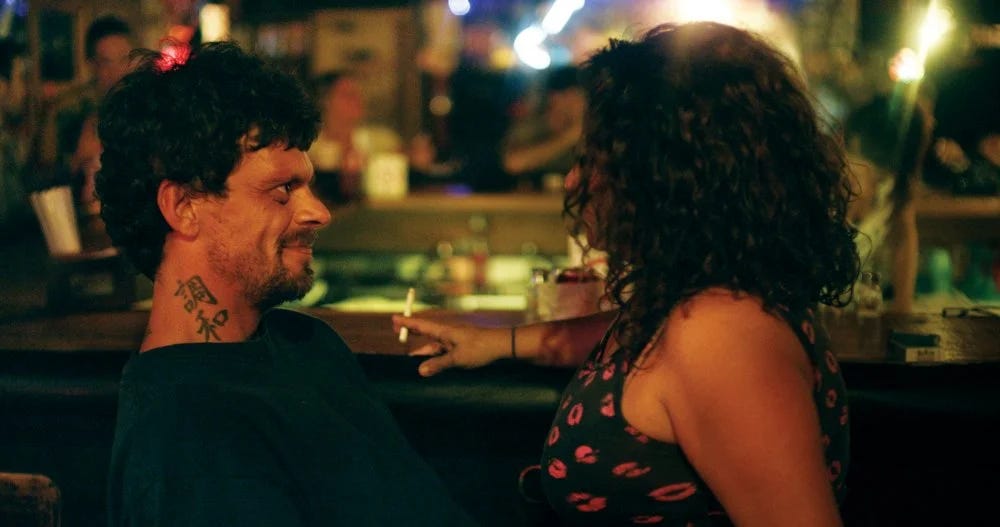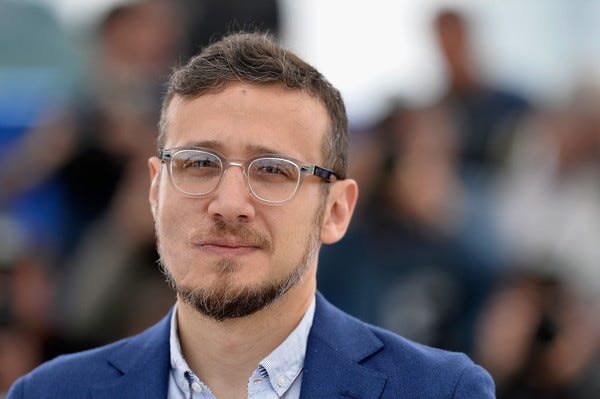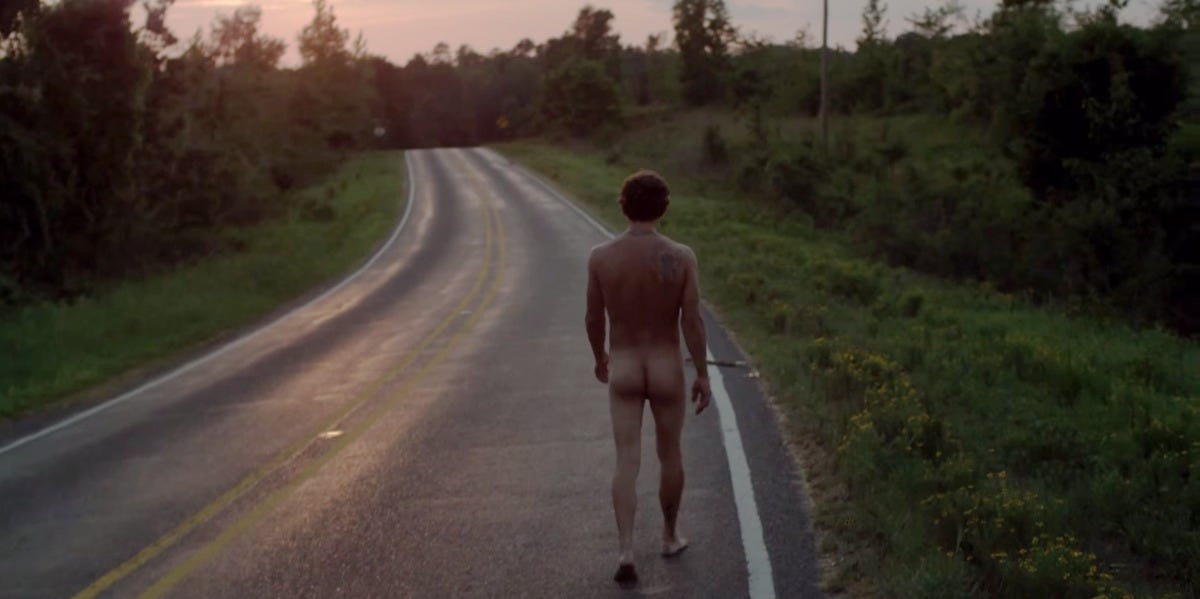Roberto Minervini on 'The Other Side'
The Italian-born director talks about ‘restoring behaviour’, the limbo between documentary and fiction and the ethics of representation…
Roberto Minervini is an Italian-born, US-residing documentary filmmaker whose fourth feature, The Other Side, premiered at Cannes in 2015’s Un Certain Regard section. Veering between moments of straight observation and more fictionalised encounters, it’s a deeply empathetic exploration of life on the margins in poor, rural Louisiana. Initially, Minervini follows Mark, a low-grade drug dealer, and his girlfriend Lisa, before branching off with a local militia who are preparing to defend their sovereignty against a neoliberal establishment. Minervini’s camera is often like an intimate confessional, shining a light on peripheral lives and refusing to condemn the meth-fuelled squalor and ardent racism on show. The film is a dark vision of a poor white America that arguably foreshadowed the splintering nation that would be globally evident just a few short years later.
ALT/KINO: How did The Other Side come about?
Robert Minervini: I’ve never ventured into completely uncharted territory - having to start from scratch with people I’ve never know before, which makes the process of establishing trust so arduous - so with this film, like the other three films, the protagonists, the subjects of the films are actually family members of people that worked with me before. In this specific case, Lisa, the main female character, is the aunt of the bull rider from my previous film, Stop the Pounding Heart. I went there just looking to tell the story of Todd, the father of the bull rider, I was in search of his roots and that’s how the project started.
A/K: So what’s your process at that point - once you’ve found the subject? I’m asking specifically with regards to the way your films blend documentary and fiction.
RM: I’m very aware of the fact that I’m working a limbo between documentary and fiction and for me that is important because I believe that conventional documentary is subject to a preconceived ethical infrastructure and dogmas that stem from journalism, right? They, in filmmaking, can become dangerous because it implies self-censorship and also it can become comfortable because, I think, abiding by a set of rules makes the filmmaker a little less responsible. In a way, I think a big motivation of doing this work is to become authorial, which means taking full responsibility for the film - which is something that perhaps makes my job or art meaningful for me, what gives me strength to continue - being exposed, taking responsibility - for what it decide to do.
Yeah, hopefully it comes from where I stand. So I’m consciously standing in the limbo between documentary and fiction. Why? Because, sometimes reenactment - or as Jean Rouche says “restoring behavior”, which again stems from reality, from the character’s story but needs to be reenacted, needs to be brought back to life - is very important and especially for them to have a chance to tell this story fully. It gives the chance to those who are perceived as victims, and those who are perceived as perpetrators, to express themselves and tell the story fully and freely. So, how do we do that? We do that, again, by jointly deciding what’s there for me to observe and what’s there for them to tell me through reenactments. So the film is a combination of observation and reenactment. Now, there is nothing there that is completely fictional, so there’s nothing that does not belong to them; that has not been of them, that will not belong to them.
A/K: So is that even the case in particular scenes? Even if it’s not literally something that happened was it always inspired by conversations that really had or do you kind of try to draw out things you were interested in?
RM: So I would say the meat, the core of every scene, comes… even when I talk about restoring behaviour, sometimes some of the conversation might have happened in the past and we are triggering the conversations again. It develops and involves before our eyes anyway, so the observational approach is still valid. But we are purposely triggering it again. It happens in all my films. For example... I’m trying to think of the biggest example in The Other Side…
“Departing from reality means being held accountable and that makes my job deeper, I believe, and more meaningful.”
A/K: One of the conversation in the film that I was going to ask you about was the one in which he talks about going to prison.
RM: Yeah, that was completely… so this is not the case as much with this one, with The Other Side the reenactments and the restoring situations concern more the actions than the words, the dialogue. Those case, they are completely bizarre confessions that Mark was doing. They surprised Lisa just as much as his marriage proposal surprised her.
A/K: Did it surprise you?
RM: It did not. So that’s an example of me knowing that it was going to happen and just scheduling with Mark without Lisa knowing and it all just unfolded before our eyes. In terms the drug-making scene, that is that is a reenactment. Scenes like that need to be scheduled, to be planned and to be done in a very safe environment. So we quantify and we evaluate - we limit risks of every kind. But in The Other Side, there are no examples of reenacted discussions, more actions. In Stop the Pounding Heart this is more of the case; restoring or triggering again conversations. There are several. Like, I don’t know if you’ve seen it but there’s the mother and daughter talking about the rules that concern dating and abiding by the precepts of the Bible. This is a conversation that had been, kind of, refreshed. There’s always something truthful, that belongs to the moment that arises even by restoring it.
A/K: I guess because they’re not actors?
RM: Yeah, exactly. It’s because they talk about it again and it’s unplanned, it’s not scripted. Things always spin out of control through what arises in the moment, which is beautiful.
A/K: And do you feel that they get a sense of catharsis in those moments? Perhaps this isn’t the case so much with The Other Side, as you’ve mentioned, but we all want to relive conversations - l’espirit de l’escalier - and in this context people potentially get to say those things that may have thought of days later.
RM: Yeah. I think there is a catharsis they’re going through, for sure. In the case of conversations, in the case of setting up a conversation - or laying the foundation, I mean, creating a space where we’re going to converse again - I never cut a take. That’s why I use the digital medium, which allows for 28 minutes of uninterrupted take before we reload a new card, without slating - so I always allow for at least an hour of free conversations. Usually, such a long time is enough time for them to get in touch with what they really want to say, what’s meaningful for them. Coincidentally, or perhaps not quite coincidentally, both shoots for Stop the Pounding Heart and The Other Side ended by the decision of the characters. After two of the final discussions of the film - Mark telling Lisa that he decided to go to prison to save his life and Sarah telling her mother of her doubts about being a good Christian, worthy of the mercy of God - in both cases the conversation lasted a very long time and after which both of those characters told me that they were done. They have reached such a catharsis and emotional vulnerability, such depth that I think there was nothing else to say in the film. But that’s how both shoots actually ended.
A/K: That’s very interesting because the way that you transition from the characters of Mark and Lisa through to the militia is very abrupt and so you maybe can sense when it was that that conversation happened. It doesn’t really feel like it would continue past that point. That shot of him leaning against the tree in the forest, contemplating things feels like a very natural cutting point for him.
RM: Yeah, and going to the forest is one of the examples of reenactment - I don’t know if that’s even the right word, but triggering the genesis of a situation. Talking to Mark about the meaning of him wearing a suit then giving this a try, seeing how it feels, and going for a walk. Putting on a suit is something that he wouldn’t do in reality, and putting on the ring without being married. So, creating this situation within which Mark could actually find something that mostly goes unspoken or revealed. Again, we could call it catharsis, or breakdown. What happens in the scene happens organically, but the situation per se would have never existed.
A/K: So is what we see in the film generally chronological?
RM: No it’s not, it’s not chronological. So the beginning - it’s better than chronological because it kind of like signals continuity for me from Stop the Pounding Heart, because with Stop the Pounding Heart I got to understand how you could take reality-based images and extrapolate from it and it can have a strong allegorical meaning. That’s what I wanted to do, just filming hunters in a forest and at a certain moment combining that with the militia actually doing their training and then you put it all together with Mark playfully getting naked in the streets - that was our being playful with it - but when you put them all together you create something highly allegorical that transcends reality. So I was aware of that and that was why I’m making a statement at the beginning creating this allegorical moment that’s entirely enigmatic.
A/K: Particularly that first shot with him sleeping naked on the side of the road. It’s such a strange image to be confronted with after the hunters and militia and the guns and camouflage.
RM: Exactly, and I feel that’s what it is. Again, being in the limbo between documentary and fiction is not just about reenactments or recreating or restoring the behaviour but also gathering from reality, extrapolating from reality, and creating things that are hyper-real and that’s really what interests me. Combining those images together created a kind of a microcosm where there’s a lot going on. The vulnerability of human beings and the empowerment of human beings. Being naked and wearing armour and what that means throughout the film. So it’s all little bits of reality that are then composing a life. For me, that’s the power of creating a collage, a patchwork for which I take full responsibility. I get involved with the meaning of it and I am the one who has to speak for them and, again, is held accountable. And what I’m trying to say is that departing from reality means being held accountable and that makes my job deeper, I believe, and more meaningful.
A/K: And this is a trend we’re seeing more and more of in documentary cinema - the so-called ‘hybrid’ film. Do you generally think documentaries are engaging enough with their own inherently constructed nature?
RM: This is probably too simplistic but I grew up in Italy where films are dubbed and we live in a world where books are translated and there is always an intermediary between the work as it originated and the audience. Even a translation is never a full, completely faithful representation of the truth - if there even is something like that - there’s someone, there’s an intermediary, someone who employs a different language. As long as the author, the filmmaker is there as an intermediary between the audience and these people, the subjects, and the film, there will be manipulation. It’s something that we can’t avoid. It’s just an extraction from reality and the point is there are several questions - ethical, moral, sociopolitical questions - that go with it, somewhat like a referee in a game. Some documentary filmmakers and I want to be part of those, believe that we have a kind of higher goal. To the best of our abilities, we’re trying to be facilitators to the story that we believe needs to be told. When I say ‘we’ I’m referring to me and the subjects. So as long as me and the subject agree on the project, on all the steps: from the genesis of the idea, making the footage, reviewing footage, and even the edit. If we agree then I think we did our best, representing reality. But it still doesn’t cease to be a representation made by people who come with a preconceived idea and judgement. It’s human nature.
A/K: Obviously you’ve made these films which are all about those on the margins or those who are disenfranchised in different ways. Why do you think you’ve been drawn to those people?
RM: I think it’s a combination of a few factors. Definitely, the most immediate comprehension is that I wanted to put a spotlight on people would never give a chance to be seen or speak up. So, in a way wanting to be a spokesperson, a facilitator, almost a defence attorney - to try to bring some justice to the world. The second, which is definitely selfish but perhaps legitimately so, is that’s cathartic for me; me wanting to get close and understand them and be with them. The film is the only chance life has given me to belong, if temporary, to their world. It’s for me to be grounded, to stay, you know? I’m planting roots. Which are blending my roots in a social context and in family environments where I feel I never belonged and I wanted to. As a human being, it helps to keep things in perspective. Especially as a director, it prevents me from getting self-absorbed and going on a huge ego trip. In a way, there is something spiritual about it and there’s something political about it, to want to become part of a social group that I believe lack support in society. So yeah, there’s also suddenly a little bit of militancy.
A/K: How do you go about building up that confidence with the subjects. I mean you’re able to observe some incredibly personal moments - some scenes that are explicit and some that aren’t - and audiences might be surprised that your subjects are open to that kind of spotlight.
RM: We talk about in the beginning, you know? We talk about a lot of things. We talk about how as soon as they expose themselves they’re kind of giving up on anonymity, they can never take it back. I make sure that they know it’s going to be highly judged and interpreted and I make sure that they want it to happen. To the best of my ability, I try to give them a perspective on what might happen, an array of potential reactions and consequences. All I can do is try to be blunt and honest about it, and then give them the choice.



